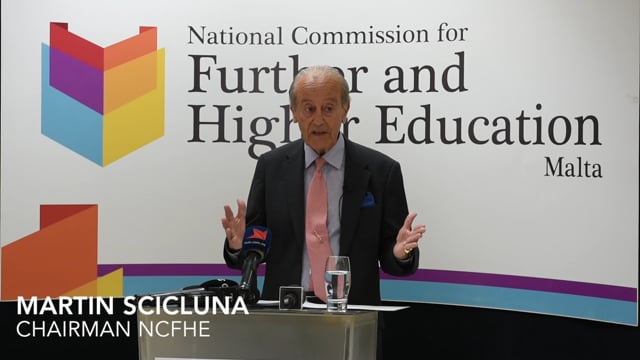[WATCH] Sadeen’s ‘American’ campus at Zonqor gains university status
Private university at Zonqor and Bormla will face spot checks and external quality audits after the second and fourth academic years



The ‘American University of Malta’ project, proposed by the Sadeen Group, has officially been accredited as a university by the National Commission for Further and Higher Education (NCFHE) after reviewing the Jordanian firm's application for about 14 months.
NCFHE chairperson Martin Scicluna said that the decision was completely independent of government policies and was the outcome of a rigorous academic and financial review process.
Although only a start-up, the AUM managed to pass the test by entering into partnership with the Clemson University of South Carolina and the De Paul University of Chicago.
The former university will ensure AUM’s quality assurance standards and help it tap into international networks, while the latter one will help it design its courses.
“Both Clemson and DePaul have a special focus on excellence in teaching and solid academic and research profiles,” Scicluna told a press conference. “The Commission is satisfied that, if AUM were to be granted a license, these institutions are fit for purpose as its partners to support its initial years of development.”
In an attempt to put to bed concerns that the NCFHE was following orders from the Prime Minister – who has frequently hailed the project as one that will give an economic boost to the South of Malta – Scicluna recounted the hoops that Sadeen had to jump through before being awarded the university license.
“I suspect that they arrived here thinking that they simply had to hand in the cash in return for a license, but they soon realized exactly how high Malta’s standards for university licensing are.”
The application was scrutinized by a panel of academics – Prof. John Portelli of the University of Toronto, Prof. John Baldacchino of the University of Dundee and Tatyana Chircop of MCAST – who were appointed by the NCFHE’s quality assurance committee. The application was originally turned down in June 2015 after it failed to meet the eligibility criteria for university licensing.
After a three month hiatus, Sadeen returned to the negotiating table in October last year, this time with Prof. John Ryder – former vice president of the American University of Ras Al Khaimah in the UAE – as its Provost.
Upon advice of the NCFHE, it changed its accreditation application to one of a higher education institute, as a first step towards achieving university accreditation. It was granted such a higher education license in January this year.
Sadeen and its investors also underwent a financial due diligence test by audit firm PricewaterhouseCoopers, the details of which the NCFHE didn’t publish on grounds of financial confidentiality.
However, Scicluna said that PWC’s due diligence exercise had resulted in a number of recommendations, all of which the NCFHE adopted as specific conditions for compliance by AUM.
The university license is subject to several stringent conditions, amongst which provisions that it will be subjected to annual audits by Clemson University and frequent spot-checks and quality audits by the NCFHE.
Sadeen will have to give written assurance that any proposed change of over 10% in the shareholding of AUM’s corporate entities, and any proposed change in the beneficiaries of its American University of Malta Foundation will have to first be approved by the NCFHE.
For the first two years, AUM will require prior approval from the NCFHE for any changes or additions to its academic and senior administrative staff.
Target of 4,600 students, 271 academic staff
The AUM project sparked outrage from the Opposition and environmentalists from the get-go because of Sadeen’s original plans to build the entire campus on land outside development at Zonqor Point. Following a large protest in Valletta, Prime Minister Joseph Muscat announced that the campus will be split into two – at Zonqor and at the former Dock 1 in Cospicua.
The AUM will consists of five faculties – in business and management, engineering, IT, arts, and arts and sciences – and will target students from the Middle East, Malta, Europe and Russia.
The courses that have been accredited so far are: BA in graphic design and animation; BSc Accountancy; BSc in Game Development; BSc in Business Administration; Masters in Business Administration; PhD in Computer and Information Science.
Sadeen plans to host around 4,600 students and employ 271 academic staff within its five faculties within ten years of starting operations.
The Jordanian firm will also run dormitory blocks to cater for around 1,000 students, and open a sports complex, food court, bookshop, and other shops to cater for students’ needs.
PN reaction
In a statement, the Nationalist Party – which opposes the siting of the private university on public land at Zonqor – accused the NCFHE of having worked on the diktat of the Prime Minister.
“The adopted procedure has been contrary to the norm. Instead of first applying for a licence, it was the Prime Minister who first decided on his own, and then an application was lodged [for the AUM] to be licensed.
“The Prime Minister challenged the process by referring to the establishment as a ‘university’ when it was not even licensed as such. His actions have poured doubt on this process,” shadow education minister Therese Comodini Cachia said.
“The PN wants the NCHFE to closely follow Sadeen’s steps, specifically the conditions it has listed, and to not bow to political pressure. It’s the commission’s responsibility to ensure constantly higher education standards.”























